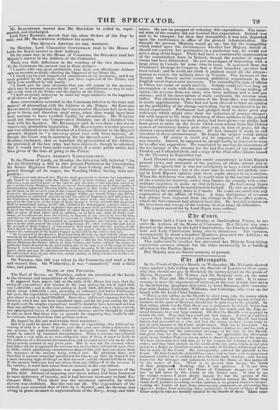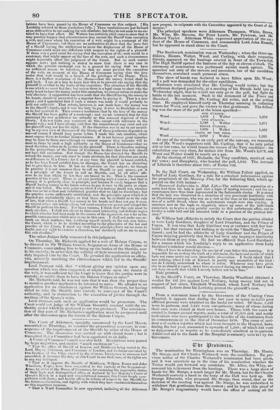'irk Artropolis.
In the Court of Queen's Bench, on Wednesday, Mr. Richards showed cause against a rule calling upon the Sheriffs of London to show cause why they should not pay to Stockdale the money levied on the goods of Messrs. Hansards. Mr. Watson and Mr. Kennedy were on the same side ; Mr. Platt and Mr. Carrington supported the rule. It is unne- cessary to state the arguments of counsel, as the case is fully laid down in the following judgment delivered by Lord Demean, after consulta- tion with Judges Littledale, Williams, and Coleridge, who were on the bench with the Lord Chief Justice- " This is a rule tattling on the Sheriffs to show cause why tie money which had been levied by them, in a ease of the plaintiff Stockdale against several de- fendants of the name of Hansard, should not be paid over to the plaintiff. In that action, which was for libel, there was a judgment by &Emit before last :Michaelmas Term, on which a writ of inquiry- was issued, mid the Jury as- sessed damages to a very large amount. 011 that the Sheriffs tire required to return the writ. They said they could not find buyers. A r. rit of venditioni exponas then issued; to which the return was, that the Sheriffs had timid buyers, had proceeded to a sale, and hail the money in their hands ready to may in such manner as the Court might direct. That was in December. An application had been previottsly made to my brother Littholale ; and he, with a view to nothing but the convenient discharge of his duty by the Sheriff; had given thne Mr the return of the writ. An application was afterwards made to my brother Patteson for an order to direct the payment of the money. We have communicated with him as to his reasons for refusing to make the order ; and they turn entirely on time words of the late rules, which do not give power to a Judge at chambers to make an order of the kind, which must there- fore be made by the Court. Ile, consequently, referred the plaintiff to the Court. To that Court the plaintiff has coille; and we' hate now to pronounce judgment whether he is entitled to have this rule made absolute ; and, having recovered the damages and judgment, to have the fruits of that judgment by tine course of law. 'What is to prevent him having the fruits of that judgment. Nothing, that I can perceive. 1 do not find, though I may infer, that the House of Commons disapproves of the law as laid down by this Court in the former case. It' that be so, thr various reasons 1 most deeply lament it ; but the opinion of the House of Commons on a point of law, in whatever manner the house may think itself justified in coming to that opinion, is no ground whatever for pre- venting the Courts of Law from pronouncing judgments, or preventing the Queen's Judges from enforcing, those judgments, in favour of those of their fellow subjects who are lawfully entitled to the benefit of them. Three reso-
lutions have been passed by the House of Commons on this subject. [His Lordship referred to these resolutions fully.] These resolutions arc put forward as au obstruction to our making the rule absolute; but they do not seem to me en-
titled to have that effect. Mr. Watson has certainly cited caseate show that it may possibly happen that circumstances may excuse the Sheriff from executing
a writ, and cases where his executiou of a writ might be a contempt of the House of Commons; but there are no authorities to show that the mere fact of a Sheriff having the misfortune to incur the displeasure of the House of Commons could make any diffeience with respect to the rights of a plaintiff.
If there was a good cause for saying that the execution of tin writ would be a contempt, that might appear on the face of the writ, and such a circumstance
might materially affect the judgment of the Court. But no such matter
appears here; and nothing is stated to show that there is any case m . which the possible contempt cats be a ground for saying that we have no sufficient reason to intertisre, or that we must prevent the execution . of the writ, on account of the House of Commons saying that the levy under that writ would be a breach of the privileges of the House. Then
there is a further resolution of the House—that the money levied shall be
paid back. I am at a loss to know how this is to prevent our saying that the plaintiff is entitled to the fruits of this execution. The situation of the Sheriffs mono which we must feel for; but unless there is a legal cause to show why the
party is not to have his money under this execution, we cannot refuse to make the rule absolute. A supposition has been made that the Sheriff having the money in
Lis hands, should be prevented by a superior force by paying it. That is a new point; and I apprehend that if such a return was made it would probably be Judd not sufficient. That reture, however, is not made here: the money was . in the Sheriff's hands, and it was his duty to pay it over to Stockdale as soon as he had received it. Then comes a resolution that by the levy of the money
the Sheriff has been guilty of a contempt ; and we are infbrmed that for this
contempt the two gentlemen are actually at this moment deprived of their liberty. I do not make any comment on this, except with reference to the present rule ; and I have already said that the commitment may exist and yet the plaintiff may nut lose his right. If the discretion was in me to act accord- ing to my own view of the case—if the liberty of these gentlemen depended on
me—of course I should long pause before I made this rule absolute, which
must expose them to further inconvenience. It is not because great injustice may be done to them now—though we cannot suppose that injustice will be
done to them by such a high authority as the House of Commons—that we
must therefore refuse to do justice to the plaintiff. There is therefore nothing in the proceedings of the house of Commons to show that this writ should not have full execution. lint though the House has directed the Sheriffs to
refund the money, our rule must be made absolute, for that direction can make no difference in this Court ; for if at any time the plaintiff is founl entitled,
as he has been found entitled here, to damages, the Court has no discretion but to give them to him. It huts no discretion on the subject ; for though in practice it is not common thus to call on Sheriffs to pay money, yet it
is a principle of the Court to call on Sheriffs, and on all other offi-
cers to .do that which by law they are bound to do. That is the constant practice of the Court. There is no case justifying such a course ; but that is because it is perfectly clear in principle, and because it rarely happens that a Sheriff having money in his hand, refu,es to pay it over to the party at whose suit it was levied. The only point on which I ever had any doubt was, whether this was so tar a clear and established practice that we had no discretion ; but the practice seems sufficiently established, and the principles upon which it is founded are undoubtedly clear; so that there can be no doubt as to the rule of law, that when a Sheriff has money in his hands and dues not pay it over, we cannot refli,l2 our interpcmition, but must exercise oar power and compel the Sheriff to perliorm his duty. For these reasons, I think that this rule must lie made absolute. I shall not advert to those most interesting and delicate topics to which allusion had been made in the course of the argument, nor refer to the possible consequences which may ensue in this C1LSC. 1 shall not make one re- mark on these matters; but, confining myself strictly to the rule now before the Court, which is to be decided according to the principles of the law and practice of the Court, I must i•Ily that those principles leave are no room to doubt, nor any right to exercise a discretion, but distinctly call on are to make this rule absolute."
The other Judges fully concurred in this judgment.
On Thursday, Mr. Richards applied for a writ of Habeas Corpus, to be directed to Sir William Gotten, Sergeant-at-Arms of the Home of Commons, commanding him to bring up the bodies of the Sheriffs, now in his custody, in order that the validity of their conimitment might he duly inquired into by the Court. l legrouded the application on affida- vits, minutely narrating the circumstances which led to the Sheriffs' imprisonment.
Lord Denman said, that " without giving any opinion upon any question which was then suggested, or might arise upon the return of the writ, it was sufficient for the Court to know that the parties were in custody, to entitle them to have the Habeas Corpus at once."
Mr. Richards said, he was not sure that it was then the proper time to mention another application he intended to matte. He alluded to an application for an attachment against Sir William Gossett, for having dared to take the Sheriffs into custody in contempt of the Court's authority, and in obstruction to the executiou of justice through the medium of the goteea's writs.
Lord Denman said, such an application would be premature. The Court could not judge of Sir William Gossett's conduct until the au- thority under which he profesed to net was produced. The consider:I- lion of that past of Mr. Richards's application must be postponed until after the discussion upon the return of the Habeas Corpus.



























 Previous page
Previous page